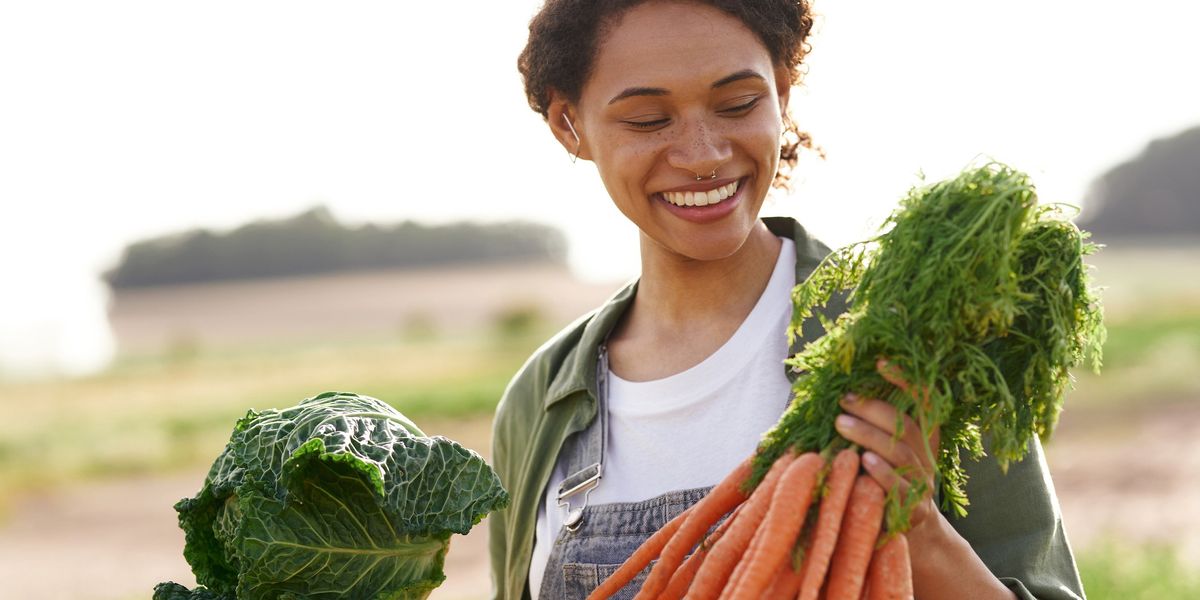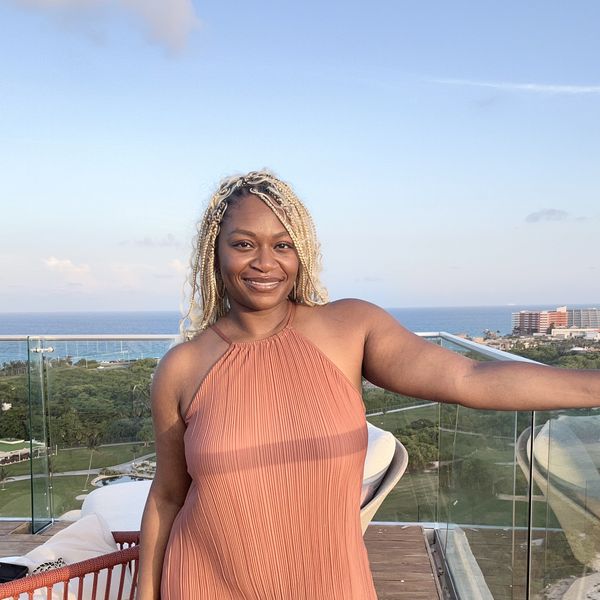
Agriculture Bae: 6 Black Women Making Farming Accessible And Revolutionary
We see it all over social: The recipes with fresh fruits and veggies and exotic spices. We see all the health-conscious gworls adding soul to what would be bland salads and soups. We double-tap content of women moving down South or overseas to nurture crops in their backyards or start urban gardens on city rooftops.
With the challenges of food deserts in Black communities, as well as the global food problem that negatively impacts communities of color all around the world, representation is important. And as Black women heading households, meal prepping, trying to stay healthy, and facing issues like lack of access and funds to keep up, there are activists, creatives, farmers, and advocates working to forge change for all of us.
Here are a few of them that we should all be giving our flowers to this Black History Month and beyond:
Abril Giles of Beauty Herbs Tea
Giles, who has shared her journey (and struggles) to gain ownership of 87 acres of Georgia land (that includes multiple streams and pear, apple, and persimmon trees, to name a few), founded an online shop that offers tea, merchandise, and classes from trained herbalists.
She also launched a herbal retreat, that allows attendees to enjoy luxury while getting knowledge on indigenous herbalism and culture, and a school. She’s been super-clear about her mission to educate about the impact of land theft and funding discrimination that Black farmers and land owners have historically faced while empowering via content embracing a mix of Afro-centric beauty, fashion, art, and of course, farming.
Kelis of Bounty Farms
It was a big shock to many when Kelis decided to pursue her love for food as a trained chef in 2014, and then, when she stepped back from publicly prioritizing music for a bit to focus on her farm in 2020, We've all been inspired not only by the beautiful star quality she lends to anything she does, but the fact that her mere presence as an unapologetic Afro-Latina woman in fab branded dungarees, continues the legacy of Black women farming the land and using the fruits for everything from food, to hair products, to sauces.
Her boxes, filled with goodies like organic face creams made with cucumber seed oil, or kits that include raspberry-infused red wine vinegar often sell out within hours of their release, giving a nod to the fact that the stuff that grows from the earth can have divine, diverse, and wildly popular uses.
Clarenda Stanley of Green Heffa Farms
Stanley, CEO of Green Heffa Farms, left a career in fundraising to start her farm and attracts a robust Instagram following of more than 180,000 with her tell-it-like-it-is depictions of what it truly means to be a Black woman who fully owns a farm. She’s big on what she calls “the 4Es: economic empowerment, equity, education, and environment,” helping to connect other underrepresented and underserved farmers with resources, educating them on starting, owning, and expanding farms, and embracing sustainability and ethical farming practices.
Jillian Hishaw
A strategist and attorney trained in agriculture, food systems, and asset protection, Hishaw has fought on behalf of Black farmers who have experienced discrimination and other tactics that threaten land ownership. She brings her passion to the work from her own personal experience: Her family lost their Oklahoma farm by shady means and they later found out the farm was replaced by an oil pump, according to her book. She has written other books educating farm and land owners about their rights and other issues related to underserved communities when it comes to the multi-trillion-dollar asset of farm real estate.
She is also the CEO of Family Agriculture Resource Management Services (F.A.R.M.S.) an international non-profit organization that provides legal services to small Black farmers within the U.S. and globally. Her efforts have helped small farms beat foreclosure, addressed rural poverty through donations and advocacy, and combated food insecurity in communities around the world.
Alexis Nikole Nelson of Black Forager
More than 5 million followers across TikTok and Instagram love her refreshing and fun content informing us all about the everyday joys of finding amazing fresh foods, as she collects and cooks everything from yellow dandelions to summer oyster mushrooms to Kentucky coffee beans. Beyond exposing us to the wonders of free goodies possibly growing right in our backyards, her content advocates for respect for nature while opening all of our eyes to consider trying to produce, spices, and herbs beyond what we might traditionally be used to. She also shares unique vegan dishes via her own recipes.
Karena Polk of Lettuce Live
Polk serves as “chief farm officer” of Lettuce Live, an urban farm project founded in 2012. A partnership with United Health Care and Wal-Mart in Memphis has expanded into a community-based initiative to launch a small business selling herbs and vegetables, as well as offering monthly cooking classes with a culinary art school.
Polk is a garden educator who hosts hands-on garden courses and team-building workshops. She also builds on-site gardens for individuals and corporations, serving the mission of Lettuce Live to “create more opportunities for people to grow their own food while ensuring under-served communities have access to fresh produce.”
Let’s make things inbox official! Sign up for the xoNecole newsletter for daily love, wellness, career, and exclusive content delivered straight to your inbox.
Featured image by Charday Penn/Getty Images
- How Brown Girl Jane Built A Brand Cultivating Balance For Black Women ›
- 9 Black Chefs Changing The Food Game ›
- These Black Girl Gardeners Believe In The Healing Magic Of Gardening ›
This article is sponsored by Hulu.
UnPrisonedhas returned for its highly anticipated second season, delving deeper into the complex dynamics of the Alexander family.
The series premiere comes a year after its debut season garnered rave reviews from fans and critics and earned record-breaking ratings for Hulu's Onyx Collective brand. UnPrisoned's success can be attributed to its raw, relatable themes and comedic appeal.
Inspired by creator Tracy McMillan's life, the show follows Paige (Kerry Washington), a therapist and single mother whose life takes an unexpected turn when her father, Edwin (Delroy Lindo) --who was released from prison-- moves in with her and her teenage son, Finn (Faly Rakotohavana).
Throughout UnPrisoned's first season, viewers witnessed how Edwin's incarceration deeply affected Paige's life and relationships. In the series, Paige unpacks her trauma through interactions with her inner child and her online followers. Meanwhile, Edwin is overcoming specific struggles with his own past that led to his life of crime, including a dysfunctional upbringing and his mother's arrest. As the Alexanders attempt to reconcile, new challenges arise.
This new season promises to further explore their unconventional family dynamic. Here are several compelling reasons why season two of UnPrisoned should be on everyone's watchlist.
The Alexander Family Life Is Still In Shambles
UnPrisoned's second season resumes where the series left off, with Paige grappling with the fallout from her troubled therapy practice and Edwin navigating life independently after moving out. Meanwhile, Finn faces his own challenges. The teenager is battling anxiety and seeking information about his father—a topic Paige avoids discussing.
The Alexander Family Are Attending Therapy To Resolve Their Underlying Issues
Amid the chaos in their lives, the Alexander family decides to mend their bond by confronting their past traumas. They seek professional help and attend therapy sessions with a “family radical healing coach,” played by John Stamos, a new cast member. This collective effort aims to unravel the complexities of their shared history and strengthen their relationships.
The process of unraveling each character's internal conflicts and their potential impact on future relationships may clash with Paige's textbook therapy approach. While Paige is used to being in the therapist's seat in both career and family, this forces her into the unfamiliar role of a patient during therapy sessions. This shift would compel her to look in the mirror and try a radically different approach.
The Alexander Family Learned A Big Lesson During A Therapy Session
In therapy, the Alexanders are tasked with addressing their individual traumas to salvage their remaining relationships. One of the family therapist’s eccentric suggestions was an exercise involving a family wrestling match. During this session, Paige faces tough questions about her refusal to share information about Finn's father.
While it's unclear whether this scene is reality or fantasy, the image of the family duking it out in the ring certainly makes for hilarious yet compelling television.
Paige Tries Dating Again Following Failed Relationships
Amid her life's chaos, Paige decides to step back into the dating field. However, her many attempts have left her with mixed results. The dating apps have turned out to be a fail, and an outing with her ex Mal (Marque Richardson), who is also her father's parole officer, doesn’t go quite as expected after he brings an unexpected guest – his new girlfriend.
The situation takes an awkward turn when Mal's new partner learns why the former couple split, partly due to Paige's self-sabotage.
UnPrisoned Is A Perfect Balance Of Comedy And Drama
As a dramedy, UnPrisoned takes a comedic approach to its heavy subjects. The show takes us on a ride with Paige's dating misadventures and navigating a friendship with her ex.
Other lighthearted moments include Edwin's attempts at CPR based on online videos and, of course, the antics of the Alexander family's unconventional new healing coach.
The second season of UnPrisoned is now available on Hulu.
UnPrisoned | Season 2 Trailer | Hulu
Feature image courtesy
'Love Island USA' Star JaNa Craig On The Reality Of Black Women On Dating Shows
Love Island USA just wrapped up its sixth season, and it has been the talk of the town. According to Nielsen, it's the No. 1 show on streaming, proving it's just as entertaining as the UK version. One of the reasons this season has been successful is due to the authentic relationships formed between the islanders in the villa.
You have the sisterhood between Serena Page, JaNa Craig, and Leah Kateb, aka PPG, and the real relationship moments between couples like Serena Page and Kordell Beckham, who were named the winners of this season. The other finalists include Leah Kateb and Miguel Harichi, Nicole Jacky and Kendall Washington, and JaNa Craig and Kenny Rodriguez.
While JaNa made it to the finale with her boo Kenny, her journey in the villa was far from perfect. Viewers saw the Las Vegas native get her heart stomped on a few times after many of her connections didn't work out.
At one point, it even looked like she was getting kicked off the island. While she had a lot of support from people watching the show, it was clear that she was in a position that many Black women on reality dating shows find themselves in: not being desired.
It has been an ongoing conversation among Black women watching reality dating shows as we see time and time again that non-Black women or racially ambiguous-looking women are often chosen over Black women, especially dark-skinned women. In a discussion with Shadow and Act, JaNa opened up about the support she received from viewers.
@cineaxries i love them 🤧 #janacraig #janaandkenny #loveislandusa #foryou #peacock #loveisland #janaloveisland #xybca #kennyloveisland #janaedit #loveislandedit #janaedits #loveislandusaedit #viral #loveislandusaseason6 #foryoupage #peacocktv
"You know what’s so crazy? I’m so grateful, because when I got my phone, the way they’re making us The Princess and The Frog…I felt honored. I will be that beautiful chocolate queen if I need to be. And the comments like 'beautiful chocolate girl,' I’m like, all Black women are beautiful. There’s the whole light skin versus dark skin, which breaks my heart. I just really don’t understand that, but I will take pride and represent us well," she said.
She also candidly discussed her experience as a dark-skinned Black woman on the show. JaNa and Serena had been in the villa since the first episode, and they were the only dark-skinned Black women there. As new men aka bombshells came into the villa, they found themselves not being wanted by many of them.
"Me and Serena literally had a heart-to-heart before Kenny came in and she’s like, I just don’t think it’s fair that the Black girls don’t get enough fair chance.' Every islander that came in, we were not their top pick. And we just [thought], maybe because we’re Black girls, and the dark-skinned Black girls. It sucked," she said.
"I’m like, 'Serena, we know what we bring to the table. We’re great personalities. A guy’s going to come in for us.' That’s when we manifested what we wanted, and that’s when I manifested Kenny."
@ashleyvera__ We love to see it 🥰 #loveislandusa #loveisland #loveisland2024 #janaandkenny #loveislandseason6 #peacock #realitytv #fypage
After many failed connections, Kenny came in and immediately turned JaNa's experience around. America watched the model get the care and attention that she deserved.
"I’m not going to hold you. When I was in the bottom for a quick second, I’m like, ‘There’s no way America doesn’t [ride for us]. I know Black America had to ride for me, but maybe because I’m a dark-skinned … hmm … maybe … you feel me? And you saw the Casa Amor lineup. Beautiful, beautiful light-skinned [women]," she said.
"We looked at each other like, 'Damn, Love Island did their big one with this. And every single Casa Amor girl was like, 'You girls are gorgeous, you guys are stunning.' They expressed love. You guys are beautiful and it felt good."
Although she and Kenny came in third place, JaNa is happy that she got her man in the end. "I think the thing I’m most grateful about is the fact that this is a beautiful love story like you guys complement each other and there’s no hate toward the skin color. It’s all love and support. I love that more than anything," she said.
"That’s why I was like, 'I won,' even though I didn’t win. And the fact that Serena won, we were like, 'Yeah, run that.' Either way, we won. And I love the support from all communities."









